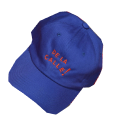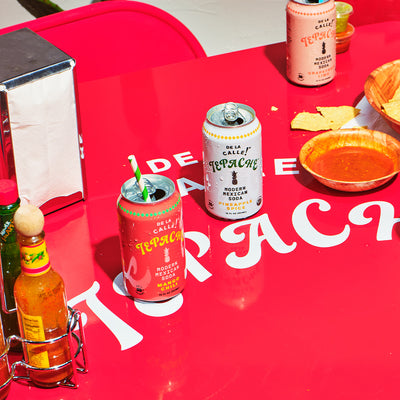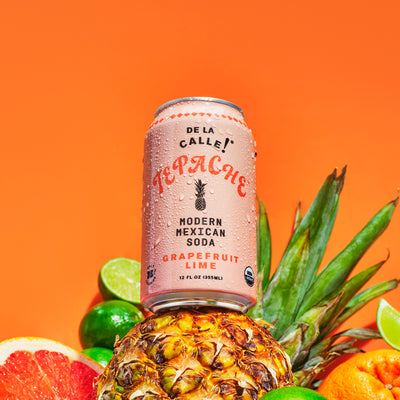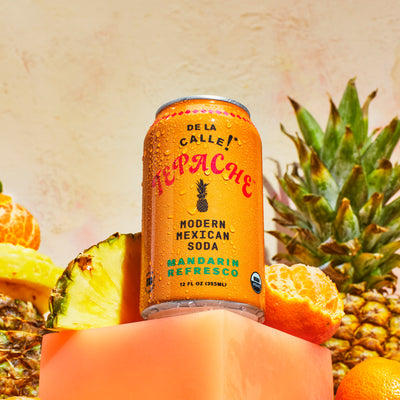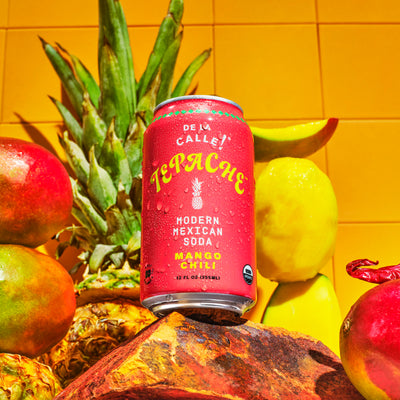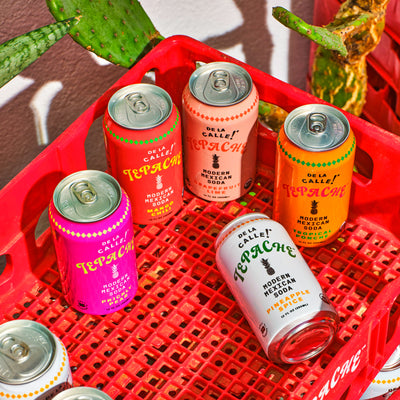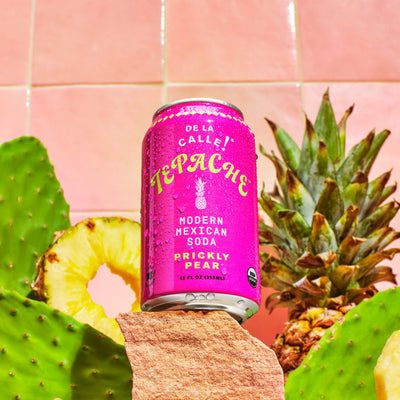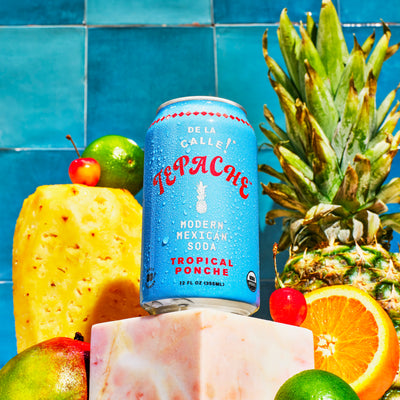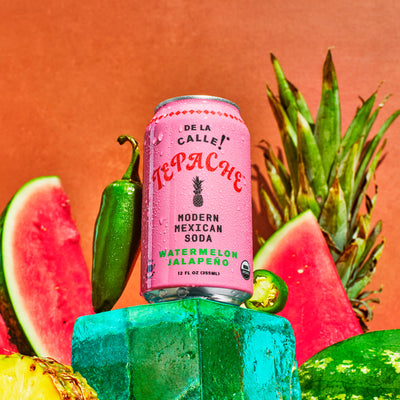Health-Ade Kombucha and De La Calle’s Tepache: What Makes Them Different

Arguably one of the most popular names in kombucha right now is Health-Ade. If you want to try a fermented beverage and are wondering if there’s more out there than Health-Ade, you might enjoy De La Calle’s tepache. Check out this article to learn all the ways that these two fermented beverages differ so that you can make the best choice for your gut!
An Overview of Health-Ade Kombucha and De La Calle Tepache
Let’s take a quick look at an overview of Health-Ade and De La Calle tepache before we dive into their differences.
What Is Health-Ade?
Health-Ade Kombucha is made from fermented tea and is known for its tart, carbonated texture. Health-Ade offers both Health-Ade Kombucha, Health-Ade Kombucha Plus, and Health-Ade Booch Pop. This article will focus primarily on comparing regular Health-Ade Kombucha with De La Calle tepache. There are several flavors of Health-Ade Kombucha, including Bubbly Rose, Pink Lady Apple, and Pomegranate.
Kombucha has been brewed for thousands of years. It is thought to date back to around 220 B.C. in Northeast China. From China, it spread to Russia and Germany in the early 20th century and started to gain popularity in the United States around 1960. Health-Ade Kombucha, and kombucha in general, is made using a symbiotic culture of bacteria and yeast, also known as a SCOBY.
What Is De La Calle Tepache?
De La Calle tepache is a traditional Mexican beverage with a twist. It is made from fermented pineapple rinds and cores, just like traditional tepache, and flavored with a wide variety of fruits and spices, giving it flavors that appeal to today’s palette. All of the fruits and spices used to make De La Calle’s tepache are inspired by the flavors of Mexican cuisine, so some of them include Mango Chili and Tamarind Citrus.
Much like kombucha, tepache is an Ancient Mexican drink. It is thought to have originated with the Maya or Aztec people and did not undergo standardization by the Spaniards when they colonized Mexico, as was the case with so many other Mexican dishes and beverages. For this reason, thousands of different tepache recipes still exist today. To make De La Calle’s distinct, flavorful tepache, the De La Calle team studied over 50 different recipes.
By The Numbers: Health-Ade vs. De La Calle
To give you a good sense of the major differences between Health-Ade kombucha and De La Calle tepache by the numbers, we’ve put two similar flavors nutritional facts side-by-side.
Health-Ade
In one bottle (16 ounces) of Health-Ade Ginger-Lemon Kombucha, there is 10% juice and:
- 70 calories
- 0 grams of fat
- 0 grams of sodium
- 12 grams of carbohydrates
- 13 grams of sugar, including 13 grams of added sugar
- 0 grams of protein
De La Calle Tepache
In one can (12 ounces) of De La Calle Ginger Manzana (apple) tepache, there is 5% juice and:
- 35 calories
- 10 mg of sodium
- 18 grams of carbohydrates
- 2 grams of dietary fiber
- 7 grams of sugar, including 0 grams of added sugar
- 7 grams of erythritol
- 0 grams of protein
Sugar Content
Based on the numbers, you can see that although there are only four more fluid ounces of liquid in a bottle of Health-Ade Kombucha than there are in a can of De La Calle tepache, there is almost double the amount of sugar. What’s more, all of the sugar in Health-Ade Kombucha is added, whereas none of the sugar in De La Calle tepache comes from added sugars.
There are a few reasons for the dramatic difference between sugar and added sugar levels in kombucha and tepache. First, tepache is fermented by microorganisms that are naturally found in the environment and on the fruits. This means that tepache is naturally sweetened and flavored by the pineapple used in fermentation. Kombucha, on the other hand, is made from fermented tea, usually black tea. Given that black tea is not naturally sweet, sugar has to be added to the drink to give it a less bitter flavor.
Additionally, as kombucha ferments, acetic acid is one of the primary acids that is produced. The primary acid produced during tepache fermentation is lactic acid. This difference in acids is what gives tepache a less sour, less funky flavor than kombucha. Given that acetic acid gives kombucha a stronger, more sour flavor, more sugar is needed to balance the sour taste out.
Caffeine Levels: Health-Ade vs. De La Calle
Another difference between Health-Ade Kombucha and De La Calle tepache is the caffeine level of both drinks. This section will take a look at what exactly caffeine is and its presence in both drinks.
What Is Caffeine?
Caffeine is a naturally occurring stimulant and is usually associated with coffee and tea. Caffeine works by stimulating the brain and the central nervous system. This stimulation has the effect of preventing tiredness and helping you feel more alert. It’s the reason that you might feel a jolt of energy after you drink a cup of coffee or, if you drink coffee regularly, why you might get a headache or feel sluggish on the days you don’t have a cup.
Although consuming coffee is generally considered safe, it is addictive, and an excess of caffeine can quickly lead to negative effects. For example, consuming too much caffeine can lead to anxiety, restlessness, trouble sleeping, headaches, migraine, and high blood pressure. It is also important to closely watch your caffeine intake if you take other medications because it can interact with different drugs.
Health-Ade vs. De La Calle Tepache
Health-Ade Kombucha contains anywhere from 8 mg to 15 mg of caffeine per bottle. The amount of caffeine in each bottle depends on how long it is left to steep and ferment. As a point of reference, a cup of coffee usually contains around 100 mg of caffeine, and a cup of black tea can have anywhere from 14 to 70 mg of caffeine.
Although Health-Ade Kombucha does have a relatively small amount of caffeine when compared to coffee, it is important to know that it does contain some caffeine. If caffeine negatively affects you or you are susceptible to the effects of caffeine, you should consider this when and if you drink kombucha.
Tepache, on the other hand, does not contain any caffeine. In terms of caffeine, drinking a can of tepache is the same as drinking a glass of water. For this reason, it is a more desirable option for people with caffeine susceptibility and kids than kombucha.
It is thought that caffeine can increase blood pressure, worsen anxiety, and make falling asleep difficult for children. For this reason, the American Academy of Pediatrics recommends that caffeine not be a part of children’s diet. If you are looking for a soda or juice replacement for your child, tepache would make a more desirable substitute than kombucha because it is caffeine-free.
Conclusion
Health-Ade Kombucha is a fermented beverage made from tea and flavored with a wide variety of fruits and spices, whereas De La Calle tepache is made from fermented pineapple. The main difference between these two beverages is that Health-Ade Kombucha contains more sugar and caffeine than De La Calle tepache, which is naturally sweetened and caffeine-free.
Given that pineapple is part of the fermentation process for tepache, it naturally has a sweet, citrusy flavor. Both of these factors make tepache a more desirable drink for kids than kombucha.
Sources:
Caffeine as a risk factor for chronic daily headache | Neurology.org
Acute and long-term cardiovascular effects of coffee: implications for coronary heart disease | NIH
